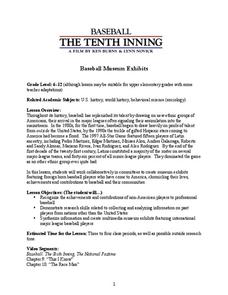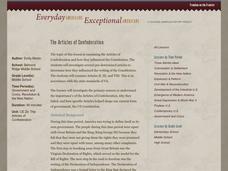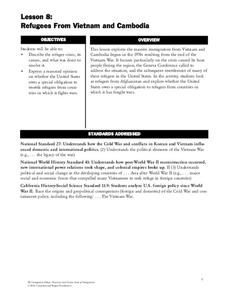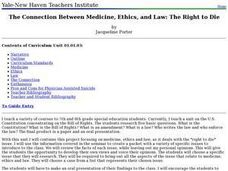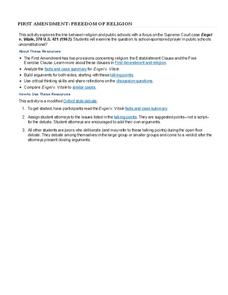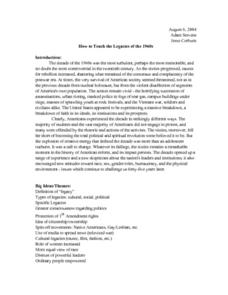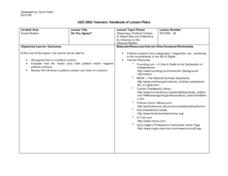Japan Society
Japan in the World Since 1945
What have US-Japanese relations been like since the conclusion of World War II? Why do some commentators identify Japan's postwar years as a subordinate independence? Invite your young historians to research Japan's status in the world...
Curated OER
Size It Up: Map Skills
Compare information from a US population cartogram and a standard US map. Learners draw conclusions about population density by analyzing census data a population distribution. They discover that census data is used to apportion seats in...
PBS
Baseball: The Tenth Inning
The intent of this resource is to explore Latin American accomplishments in baseball, recognizing the changes in demographics of players over the last century. Social studies classes begin with a discussion and brainstorm surrounding...
Curated OER
Latinos and the Fourteenth Amendment: A Primary Source Document Activity
Eighth graders explore the effect of the Fourteenth Amendment. In this US History lesson, 8th graders read and analyze primary source documents. Students write a three minute paper demonstrating their understanding of the fourteenth...
Mrs. Hodges' Social Studies Classes
I Have Rights?!
Do young people have rights in the United States? Your pupils will not only learn the answer to this important question, but will also build vocabulary through cloze activities and gain a thorough introduction to the Bill of Rights.
Roy Rosenzweig Center for History and New Media
The Articles of Confederation
Have you ever started a project only to realize you need to scrap it and start over? Scholars analyze the issues leading to the fall of the Articles of Confederation. A group investigation into Articles II, III, and VIII unveil the...
Theodore Roosevelt Association
Interpreting the Past; Assessing Its Impact on the Present
Even though the presidency of Theodore Roosevelt ended over 100 years ago, we can still learn something from his stances and policies that is applicable today. Class members first look over a list of prevalent political issues from the...
Constitutional Rights Foundation
Refugees From Vietnam and Cambodia
The United States may have pulled its troops from the Vietnam War in 1973, but the conflict was far from over for the citizens living in Asia at the time. An informative resource lets learners know about the wave of over 220,000...
Curated OER
The Connection Between Medicine, Ethics, and Law: The Right to Die
Young scholars in a special education class examine the United States Constitution. Using the text, they answer five research questions and discuss the amendments that concern medicine, ethics and law of the right to die issue. They...
Curated OER
Supreme Court Decisions on Freedom of Religion
What does freedom of religion mean? Analyze a series of Supreme Court cases where the First Amendment right to freedom of religion was put to the test. They discuss the cases' outcomes and argue whether the right decision was made....
Curated OER
Supreme court Decisions on Freedom of Religion
Eleventh graders analyze the limits and bounds of religious freedom issues in the United States through several Supreme Court case decisions.
Center for Civic Education
Citizenship Schools and Civic Education During the Civil Rights Movement and in the Present
Your young historians will discover the importance that citizenship education has played in the social progress of the United States as they learn about early efforts to discourage African Americans from voting in the 1960s.
State Bar of Texas
Texas v. Johnson
If you saw a person burning an American flag, how would you feel? Scholars analyze the concept of freedom of expression and speech with the Supreme Court case Texas v. Johnson. A short video clip creates open discussion in pairs on the...
NPR
Progressive Era Lesson Plan
The women working for equal rights in the early 20th century weren't a part of one large group; rather, they were members of dozens of small groups focused on social reform. Explore the ways groups in the Progressive Era like National...
Teaching Tolerance
Changing Demographics: What Can We Do to Promote Respect?
America has always been seen as a melting pot to the world. Scholars research the concept of blending cultures in the United States and how it is changing over time. The final lesson plan of a four-part series analyzes the changing...
Curated OER
Building a Human Rights Document
Young scholars identify the issue of basic human rights, examine the importance of the UDHR, and compare it to United States Bill of Rights. They create a definition of human rights as a class. Students are divided into groups of four...
Curated OER
How Congress Works
Young scholars study the role of the U.S. Congress in American government as described in the Constitution. For this U.S. government lesson, students watch an overhead about 'public criticisms' in the legislative process and complete a...
Curated OER
When is Humanitarian Intervention Justified?
Students analyze different foreign policies to derive their own idea of what constitutes appropriate intervention by a government. They complete a detailed proposal for their own Declaration of Human Rights.
Curated OER
Vote for Me!
Tenth graders analyze voter trends in South Carolina and discover techniques canddidates and their parties use to convince us to vote their way. They are able to locate voting statistics for their county; compare the number of...
Administrative Office of the US Courts
Engel v. Vitale
"Is school-sponsored prayer in public schools unconstitutional?" That is the question teams debate as they consider the arguments presented to the Supreme Court in Engel v. Vitale. The attorneys study the provided talking points and...
Curated OER
How to Teach the Legacies of the 1960s
Students consider which aspects of world around them have roots in 1960s, research and compare 1960s to today with regards to Civil and Women's Rights, Vietnam, counterculture, music, voting, and economic rights, and explore legacy of...
Curated OER
Do You Agree?
High schoolers recognize bias in a political cartoon, evaluate how the media uses both positive and/or negative political cartoons, and assess the influence a political cartoon can have on a person.
Curated OER
Freedom to Worship
Fifth graders read the biographies of seven colonists and determine their position on the freedom of religion. They conduct a panel discussion of seven personalities and debate the religious freedom in America.
Street Law
The Challenge of Selecting an Ideal Supreme Court Nominee
Nearly every president has had the opportunity to name a nominee to the United States Supreme Court. But what makes someone an ideal candidate to become a Supreme Court justice? High schoolers test their prior knowledge about the Supreme...
Other popular searches
- Us Constitution Amendments
- The Us Constitution
- Us Constitution Day
- Us Constitution Word Puzzles
- Us Constitution Lessons
- Amending the Us Constitution
- Us Constitution Test
- Us Constitution Projects
- Us Constitution Activity
- Forming the Us Constitution
- Us Constitutional Convention
- Us Constitution Article 1




